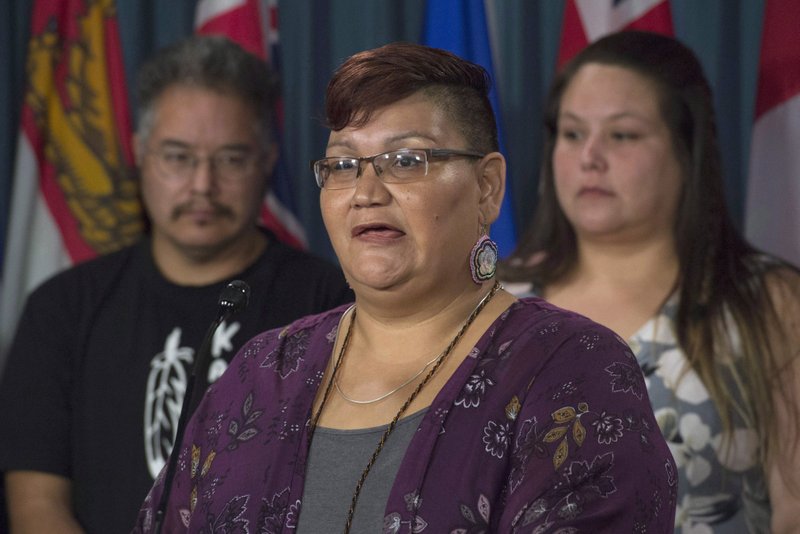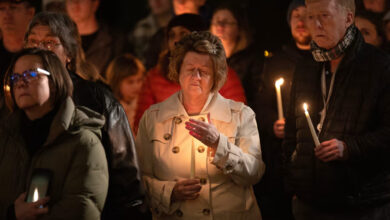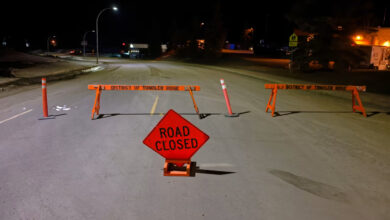
Colleen Cardinal often wondered why her parents turned bright red in the sun but she grew dark along with her sisters. The puzzle was solved when she was a young teen, and the woman she had thought of as her mother disclosed that she had been picked out of a catalog of native children available for adoption.
Cardinal was one of thousands of indigenous children taken from their birth families from the 1960s to mid-1980s and sent to live with white families, who officials at the time insisted could give them better care. Many lost touch with their original culture and language.
It echoes the history of residential schools in Canada. Some 150,000 First Nations, Inuit and Metis children were taken from their families over much of the last century and put in government schools, where they were forced to convert to Christianity and not allowed to speak their native languages. Many were beaten and verbally abused, and up to 6,000 are said to have died.
The government has since apologized and offered compensation for the victims of residential schools, and now it’s paying compensation for what is known as the “Sixties Scoop” in which children were essentially scooped up from reservations and their native families. But many say the settlement is too little, too late.
Cardinal says it won’t undo what was for her a traumatic experience. She was taken from her Plains Cree family in Alberta and sent to a home about 1,600 miles (2,600 kilometers) away alongside a lake in rural Ontario, where she said her two older sisters were sexually abused.
“We had to flee that home to escape from physical and sexual violence. My two older sisters were sexually molested,” Cardinal said.
A few years earlier Cardinal had been shocked to find out she was native.
“As a child you want to hear that you are loved and people wanted you,” Cardinal said. “What I heard instead was, ‘Well, we picked you out of a catalog of native children up for adoption.’”
The only catalog Cardinal knew was the Sears catalog — not the lists from government or religious organizations that included pictures of children available for adoption.
“I was thinking, ‘There was a catalog of native kids like me?’ That stayed in my mind forever — that I was picked out of a catalog of native children,” she said.
The victims of the “Sixties Scoop” began suing the Canadian government in 2010, claiming damages for the loss of their language, culture and identity. Ontario Superior Court Justice Edward Belobaba ruled last February that Canada had breached its “duty of care” to the children and found the government liable.
A tearful Indigenous Relations Minister Carolyn Bennett announced the settlement in early October.
“This policy was based on race,” Bennett said in an interview later with The Associated Press. “It was unconscionable that government thought that would be better for the child.
“We know now that it really isn’t. In terms of health, education or economic outcomes, it is a disaster to take kids away from their language, their culture, their community, their extended family.”
The Sixties Scoop settlement for an estimated 20,000 people is aimed at resolving numerous related lawsuits. The victims will share 750 million Canadian dollars ($586 million), with individual amounts to be determined later. Many said they expect that to be around 50,000 Canadian dollars each.
Cardinal said she might invest the money.
“Fifty thousand is not very much money,” she said. “That’s like one year income for a middle class worker.”
Cardinal, 44, is happy the government has set aside an additional 50 million dollars for a healing and reconciliation foundation. She is the co-founder and coordinator of the National Indigenous Survivors of Child Welfare Network, which brings together survivors to talk and heal. She now lives in Ottawa and is teaching her four children about their native culture.
Many remain close to their adoptive families, but some, like Cardinal, say they were scarred by the experience. She believes she was taken from her birth parents to be assimilated, but acknowledged that like many, she came from a family where there was neglect and alcoholism. Most of her biological family has passed away and she wasn’t able to connect with them in the way she had wanted.
But her organization has helped others reconnect. Brent Mitchell was taken from his Metis mother in Manitoba when he was 1 and shipped off to New Zealand when he was 5. Records indicate there was alcohol abuse in his birth home. But he said he endured beatings and verbal taunts in the foster homes in New Zealand and sexual abuse outside it by a predator. He struggled to recover, attempting suicide at three different points in his life.
“That was always on the cards,” Mitchell said. “They couldn’t give me a pill to take away all the pain and hurt.”
Mitchell is 59 now and speaks with a New Zealand accent. He returned to Canada this year. “I met one of my brothers and one of my sisters for the first time,” he said. “It nearly floored me.”
But the settlement does not cover Metis Canadians, people of mixed indigenous and European ancestry like Mitchell.
Duane Morrisseau-Beck, a Metis Canadian who was taken at birth and adopted by a Manitoba family, doesn’t understand why. The government has said it wants to reach a settlement with Metis, too, but Morrisseau-Beck said if the first deal is any indication, it won’t be good enough.
“This fails miserably in terms of the compensation that should be awarded,” he said.
Morrisseau-Beck became an alcoholic in high school and contracted HIV. He felt estranged from his adoptive family and assumed he would be by himself for the rest of his life and would die alone. But he reconnected with his culture and his birth family just over 20 years ago. His mother believes the adoption papers were forged or signed under false pretenses.
“There was always this question of who were my parents. Who is my mon and my dad,” he said. “It left a very distinct mark on my life.”
Cardinal spent most of her life trying to be white so that people would accept her, but she now has embraced her indigenous roots.
“A lot of us were taken out of the country, taken out of the province, taken so far away from our family and isolated. And a lot of us still haven’t come home yet,” Cardinal said.




